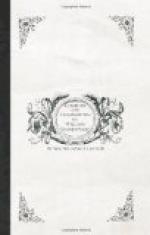Sir Thomas.
“We must see that,—they being taken upon his person when apprehended.”
Sir Silas.
“Let Ephraim read them, then; it behooveth not me, a Master of Arts, to con a whelp’s whining.”
Sir Thomas.
“Do thou read them aloud unto us, good Master Ephraim.”
Whereupon I took the papers which young Willy had not bestowed much pains on; and they posed and puzzled me grievously, for they were blotted and scrawled in many places, as if somebody had put him out. These likewise I thought fit, after long consideration, to write better, and preserve, great as the loss of time is when men of business take in hand such unseemly matters. However, they are decenter than most, and not without their moral; for example:-
“To the owlet.
“Who, O thou sapient, saintly bird!
Thy shouted warnings ever heard
Unbleached by
fear?
The blue-faced blubbering imp, who steals
Yon turnips, thinks thee at his heels,
Afar or near.
“The brawnier churl, who brags at times
To front and top the rankest crimes, —
To paunch a deer,
Quarter a priest, or squeeze a wench, —
Scuds from thee, clammy as a tench,
He knows not where.
“For this the righteous Lord of all
Consigns to thee the castle-wall,
When, many a year,
Closed in the chancel-vaults, are eyes
Rainy or sunny at the sighs
Of knight or peer.”
Sir Thomas, when I had ended, said unto me,
“No harm herein; but are they over?”
I replied, “Yea, sir!”
“I miss the posy,” quoth he; “there is usually a lump of sugar, or a smack thereof at the bottom of the glass. They who are inexperienced in poetry do write it as boys do their copies in the copy-book, without a flourish at the finis. It is only the master who can do this befittingly.”
I bowed unto his worship reverentially, thinking of a surety he meant me, and returned my best thanks in set language. But his worship rebuffed them, and told me graciously that he had an eye on another of very different quality; that the plain sense of his discourse might do for me, the subtler was certainly for himself. He added that in his younger days he had heard from a person of great parts, and had since profited by it, that ordinary poets are like adders,—the tail blunt and the body rough, and the whole reptile cold-blooded and sluggish: “whereas we,” he subjoined, “leap and caracole and curvet, and are as warm as velvet, and as sleek as satin, and as perfumed as a Naples fan, in every part of us; and the end of our poems is as pointed as a perch’s back-fin, and it requires as much nicety to pick it up as a needle{38a} at nine groats the hundred.”
Then turning toward the culprit, he said mildly unto him, —
“Now why canst thou not apply thyself unto study? Why canst thou not ask advice of thy superiors in rank and wisdom? In a few years, under good discipline, thou mightest rise from the owlet unto the peacock. I know not what pleasant things might not come into the youthful head thereupon.




